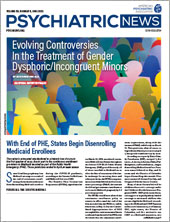The number of psychiatrists with at least one manifestation of burnout increased 50% between 2020 and 2021, putting us in a slightly better position than physicians overall at 64%,
according to a 2022 AMA report. Twenty percent fewer psychiatrists felt satisfied with work-life integration. Physicians as a whole were more depressed and less professionally fulfilled, and many fewer would choose to become a doctor again.
While the COVID-19 pandemic is a clear factor, administrative time has also increased and is tied to lower career satisfaction. Seventy percent of physicians spend more than
10 hours a week on administrative tasks, up 13% in one year, according to the AMA. A
2014 report by Steffie Woolhandler, M.D., M.P.H., et al. found that psychiatrists spend over 20% of their time on these tasks, the highest among all medical specialties. Since the time we spend seeing patients has not changed, it is being poached from our personal time.
This dire picture leaves some wondering why anyone would choose to be a physician, a question answered by the worsening physician shortage. As psychiatrists, our work reflects our own wellness in a singular manner among physicians. A burned-out psychiatrist will struggle to provide the same holding environment, supportive ear, or thoughtful insight as one who feels fresh. Protecting ourselves is protecting our patients.
One avenue for change is through better protecting our time. Psychiatry is a service industry: We have a symbiotic relationship with patients in which we provide our time and expertise, and they support our livelihood. However, when we step outside of the office, suddenly expectations change: We are widely expected to respond to communications promptly and free of charge. This may be an issue of particular relevance to psychiatry, both because relationships with patients are often closer than in other specialties, and because some psychiatric issues can manifest through frequent contact.
A recent
New York Times article, “
Emailing Your Doctor May Carry a Fee,” opens with a complaint against a psychiatric clinic that bills for emailed clinical contacts (that is., not refill requests or scheduling matters): “Every dollar counts,” said the patient’s family. The author noted that such communications have increased significantly, with Cleveland Clinic observing a doubled email volume since 2019 and a study of Epic data showing a 50% increase since 2020. Framing this as an issue of “access to care” because “every dollar counts” is an insidious and invalid argument that doctors should work for free. In fact, billing for clinical communications saves patients time and money over what should be the actual alternative: not free care, but a scheduled office visit. Failing to address this under the shared doctor-patient wish that we can provide limitless free treatment actually results in
worse care and access, as physicians become increasingly burned out and leave the field.
This problem originated with the widespread implementation of online portal accounts that allow patients to email physicians. Prior to that, if a patient called the physician’s office with a clinical concern, the front desk would often just schedule a visit. This unfettered access has taught patients that a free email is sometimes an acceptable replacement for a paid office visit. Patient portals have clear benefits, but the ability for patients to message doctors directly was designed by businesspeople, not doctors, and it shows. It is a corporate-cultural disregard of doctors’ time, if not a willful exploitation thereof.
Many large hospital systems, including the U.S. Department of Veterans Affairs, already bill for clinical contacts. I have done so since opening my practice in 2020. I discuss this policy when scheduling an initial consultation, and it’s detailed in our signed treatment agreement. While some patients still push back, most are grateful for a less expensive and cumbersome alternative to a full visit. I find that protecting my time in this manner allows me to accept complex cases that other psychiatrists decline. This increases access to care for the patients who need it the most.
Appropriate billing for clinical communication saves patients time and money, improves their access to care, and protects us from burnout while allowing us to continue providing high-quality care. The path forward is to offer patients the choice not of “free clinical communication or paid clinical communication,” but of “paid clinical communication or paid office visits.” The setting—office or email—is irrelevant: if the matter requires our medical expertise and documentation, then as a matter of protecting both ourselves and, by extension, our patients, it ought to be compensated. ■

